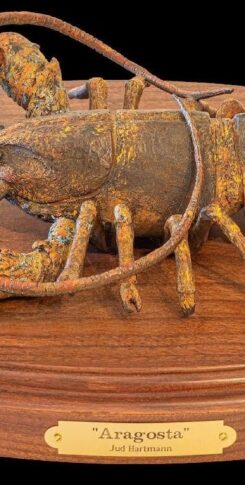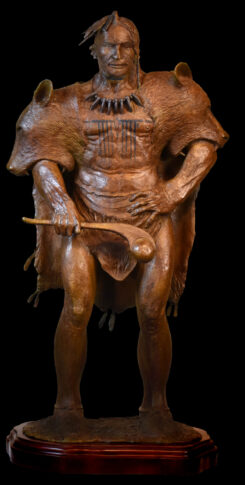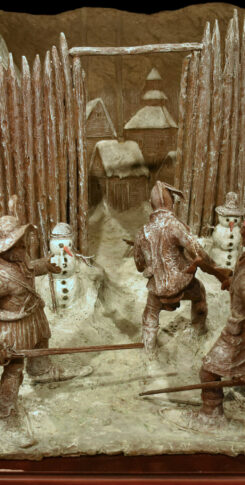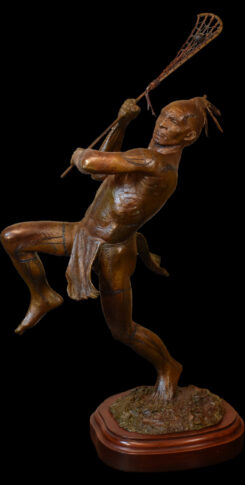Bronze edition: 20 | Height: 30″
An Iroquois chief and speaker of the Grand Council at Onondaga
Canassetego was an Iroquois chief known not only for his large physical stature, but also for his charisma and his oratorical skill. He was elected speaker of the Grand Council at Onondaga, the spokesman for the most powerful Indian confederacy ever created in America.
In 1744 at the treaty of Lancaster, Pennsylvania, an event occurred which was to have far reaching consequences. At this important gathering attended by many Indian nations, colonial governors and other representatives of the British colonies, an old Iroquois chief, whose features (in the words of Lt. governor of New York, Cadwallader Colden), “reminded me of the busts of Cicero … and whose oratory would have pleased in any part of the world,” delivered a memorable and dramatic metaphor. His speech was to be the catalyst in initiating a series of ideas and events, beginning with Franklin’s Albany Plan of Union, (1754), which ultimately led to the birth of a new nation, exactly to the day, thirty-two years later on the 4th of July, 1776.
An unusually tall man, Canassetego was well muscled, especially in the legs and chest and athletic well past his 50th year. His size and booming voice, aided by a commanding presence gave him what later writers would refer to as charisma – conversation stopped short when he entered the room. Because of his oratory which was noted for both dignity and power, Canassetego was elected speaker of the Grand Council at Onondaga and was thus, in Lancaster that day, spokesman for the most powerful Indian confederacy ever created in North America.
Striding forward to address the immense gathering, all was hushed in anticipation. Frustrated by the repeated inability of the colonies to unite in a concerted effort against the common enemy French Canada, Canassetego took from his quiver a single arrow. Effortlessly he broke it in two and berated the colonies: “You are all separate and as easily broken as this single arrow.” Then taking from his quiver five arrows wrapped in a ceremonial snakeskin (representing the Iroquois League), he showed that they had a combined strength which could not be broken. “Our wise forefathers,” he said, “established union and amity between the five nations. This has made us formidable. This has given us great weight and authority over our neighboring nations. We are a powerful confederacy and by your observing the same methods … you too will acquire fresh strength and power; Therefore whatever befalls you, do not fall out with one another!”
This admonition would echo throughout the colonies for over a generation and would be used not only as a rallying cry against the French but against the British tyranny as well. In 1775, representatives from the 2nd Continental Congress met with the Iroquois: “Our forefathers,” said the Americans, “rejoiced to hear Canassetego’s words and they sank deep into their hearts. The advice was good and it was kind. They said to one another the Five Nations are a wise people, let us hearken to their council and teach our children to follow it. Our old men have done so. They have frequently taken a single arrow and said: Children, see how easily it is broken, then have tied 12 together with strong cords – and our strongest men could not break them. See, said they, this is what the Five Nations mean : divided, a single man may destroy you, united you are a match for the whole world!”
Another, though less momentous incident at the same Lancaster Treaty, reveals Canassetego’s wonderful sense of irony and wit. Responding to an offer of the Virginia legislature to the Iroquois, inviting them to send six youths to attend The College of William and Mary, he replied: “We know how highly you esteem the kind of learning taught in these colleges, and the maintenance of our young men, while with you, would be very expensive to you. We are convinced, therefore, that you mean to do us good by your proposal; and we thank you heartily. But you who are so wise must know that different nations have different conceptions of things; and you will not therefore take it amiss if our ideas of this kind of education happen not to be the same with yours. We have had some experience of it. Several of our young people were formerly brought up in the Colleges of the Northern Provinces; They were instructed in your sciences; but when they came back to us, they were bad runners, ignorant of every means of living in the woods, unable to bear either cold or hunger, knew neither how to build a cabin, take a deer or kill an enemy, spoke our language imperfectly, were therefore neither fit for hunters, warriors nor counselors; They were totally good for nothing. We are however not the less obliged for your kind offer, though we decline accepting it; and to show our grateful sense of it, if the gentlemen of Virginia shall send us a dozen of their sons, we will take great care of their education, instruct them in all we know and make men of them!”





